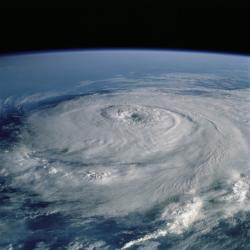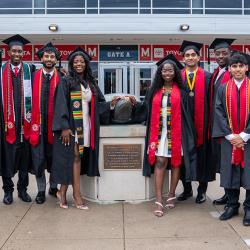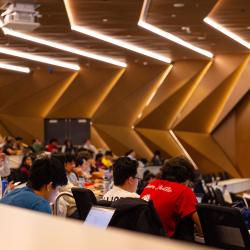UMD’s Antonio Busalacchi Named President of the University Corporation for Atmospheric Research
Antonio Busalacchi, professor of atmospheric and oceanic science at the University of Maryland and director of the Earth System Science Interdisciplinary Center (ESSIC), will become president of the University Corporation for Atmospheric Research (UCAR) on August 1, 2016.
“During his time here, Tony has taken great strides to ensure that the University of Maryland is a leader in Earth system science research and education,” said Jayanth Banavar, dean of the UMD College of Computer, Mathematical, and Natural Sciences. “While we will miss him tremendously here at Maryland, we are just one university, so we will take solace knowing that Tony will have a much greater impact on our nation and our world by advancing the scientific efforts of more than 100 colleges and universities in his new position.”
Fernando Miralles-Wilhelm, a professor of atmospheric and oceanic science at UMD who has been serving as interim director of ESSIC since January 2016 when Busalacchi began sabbatical leave, will continue in the role of ESSIC interim director. Miralles-Wilhelm will lead the interdisciplinary research center encompassing meteorology, oceanography, geology, and geography to investigate how the land, oceans, and atmosphere react with and influence one another.
At UCAR, Busalacchi will take the helm from National Center for Atmospheric Research (NCAR) Deputy Director and Chief Operating Officer Michael Thompson, who has served as interim president of UCAR since July 2015. Previously, Thomas Bogdan served as president from 2012 to 2015.
UCAR is a nonprofit consortium made up of more than 100 member colleges and universities focused on research and training in the atmospheric and related Earth system sciences. UCAR’s primary activity is managing NCAR on behalf of the National Science Foundation, NCAR’s sponsor. UCAR also oversees a variety of education and scientific support activities under the umbrella of the UCAR Community Programs.
Research at UCAR/NCAR advances understanding of severe weather, climate, geomagnetic storms, and other environmental factors that have significant impacts on society in the United States and overseas, including the global economy. This work helps to improve prediction of these phenomena and strengthen national and global resilience to them.
“Tony Busalacchi is an exceptional scientist and leader with a breadth of experience that will be especially important as UCAR extends its role as a leader and advocate for Earth system science,” said Eric Betterton of the University of Arizona, who chairs the UCAR Board of Trustees.
Busalacchi has chaired or co-chaired many committees for the National Academy of Sciences (NAS) and its National Research Council, as well as the World Climate Research Programme. He has served on the NAS Board on Atmospheric Sciences and Climate (BASC) since 2003 and led BASC as chair from 2009–2014. Busalacchi has also frequently testified before Congress and is author or co-author of more than 100 peer-reviewed papers related to atmosphere-ocean interactions.
Prior to joining UMD in 2000, Busalacchi led the Laboratory for Hydrospheric Processes at the NASA Goddard Spaceflight Center (1991–2000) and the laboratory's Oceans and Ice Branch (1988-1990).
Busalacchi is a Fellow of the American Meteorological Society, American Geophysical Union and American Association for the Advancement of Science. Earlier this year, he was elected to the National Academy of Engineering.
“It’s an absolute honor and privilege to be selected to lead UCAR,” Busalacchi said. “Building on a long history of weather, water and climate research, UCAR/NCAR has enormous potential to be the world’s leading institution in Earth system science across basic research, education and training, and science in support of society. I’m excited to lead the organization into a new era in partnership with NCAR Director James Hurrell and our university member community.”
UCAR manages NCAR under sponsorship by the National Science Foundation (NSF). Any opinions, findings and conclusions, or recommendations expressed in this publication are those of the author(s) and do not necessarily reflect the views of the NSF.
Media Relations Contacts: (UMD) Abby Robinson, 301-405-5845, abbyr@umd.edu; (UCAR/NCAR) David Hosansky, 303-497-8611 or 720-470-2073, hosansky@ucar.edu; (UCAR/NCAR) Rachael Drummond, 303-497-8604 or 720-352-1201, rachaeld@ucar.edu
University of Maryland
College of Computer, Mathematical, and Natural Sciences
2300 Symons Hall,
College Park, MD 20742
www.cmns.umd.edu
@UMDscience
About the College of Computer, Mathematical, and Natural Sciences
The College of Computer, Mathematical, and Natural Sciences at the University of Maryland educates more than 7,000 future scientific leaders in its undergraduate and graduate programs each year. The college's 10 departments and more than a dozen interdisciplinary research centers foster scientific discovery with annual sponsored research funding exceeding $150 million.







